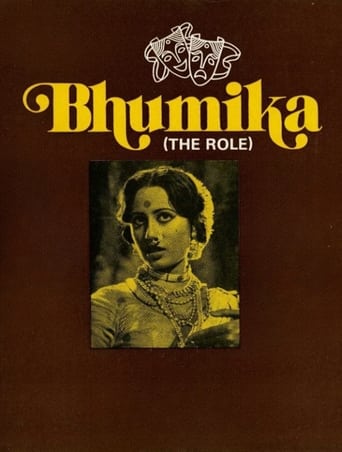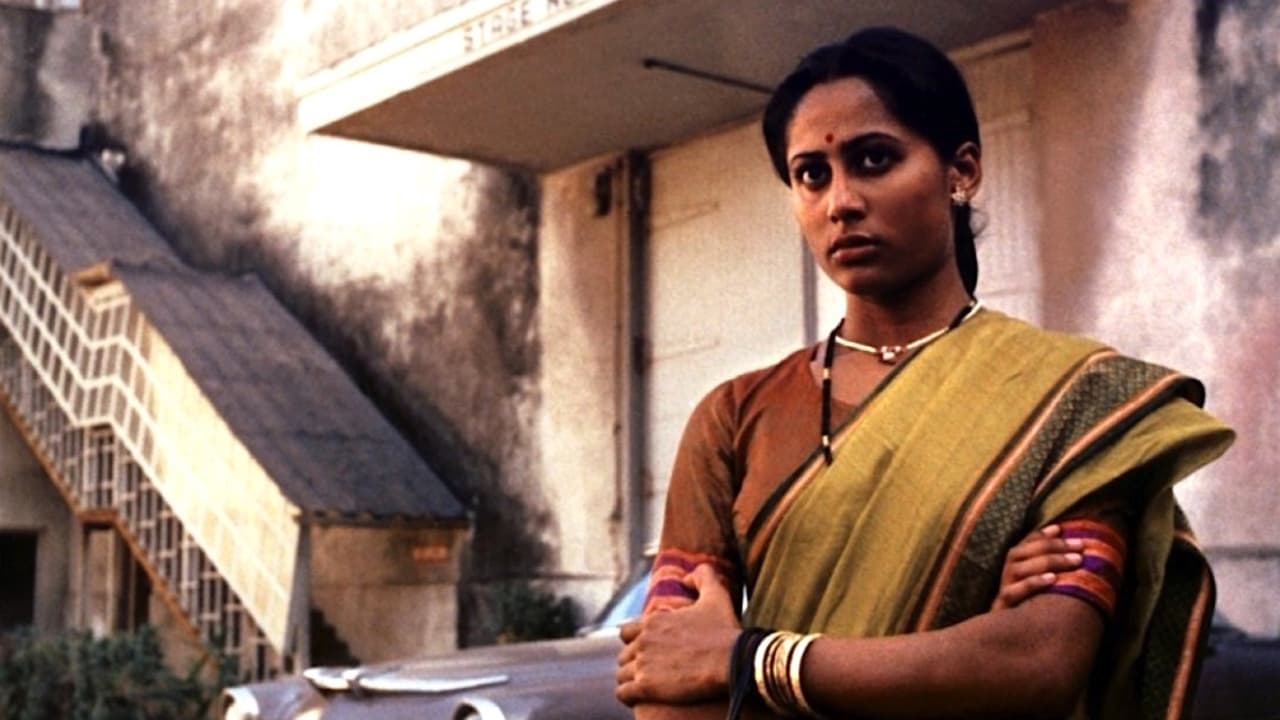Herag Halli
The movie is riveting akin to a suspense movie since the story builds up to a crescendo. Any one with a hint of how a good film should be made should see this marvel of a movie. Shyam Benegal is a genius the like of Raj Kapoor, Hrishikesh Mukherjee and Satyajit Ray. For example there is a long shot of a corridor with no action or actors but it builds a certain expectation. The scree play is one of the best in an Indian movie. The story even though has a disclaimer is intriguing since it is loosely based on an actress in the 40's. All have acted well but Smith Patil is the ace as in the movie within the movie she is in the witness stand and switches from acting to a normal with such an abandon that clearly set her apart from an amateur actress. This is one incredible movie that will never happen again since Bollywood is taken over by pubescent directors with kachada movies that are not even worth to be spit on.
Chrysanthepop
With 'Bhumika: The Role', Shyam Benegal has created one of the finest character studies of Indian cinema. Based on the life of 40's Marathi actress Hansa Wadkar, is a biopic but very different from the conventional one. The film follows the life of a troubled actress who yearns to live a life of freedom where she can live the way she chooses. However, she only finds little satisfaction in her roles and while she has played a variety of characters in her films, she's stuck with the same role in life trapped in a man's world.'Bhumika: The Role' is an exceptionally well-made film. Benegal is clearly influenced by Satyajit Ray. The black and white flashback sequences echo scenes from Ray's 'Nayak' and 'Patther Panchali'. His attention to detail is excellent as he adds subtle layers to the films (for example, notice how time is depicted through the news on the radio). The absence of a background score make the scenes raw and gritty. The remarkable cinematography deserves special mention and the lighting is superb.But what would 'Bhumika: The Role' be without Smita Patil's tour-de-force performance? Patil was only in her very early 20s when she shot for the film and yet she's incredibly convincing as a bubbly teenager, a grown-up actress and a mother of a mother-to-be. Urvashi is a complex and demanding character with many shades and that cannot be easy for an ordinary actor to play but Patil does it with sheer ease and intensity. She dazzles the screen with a restrained and natural performance.Patil is effectively supported by a strong cast that includes Sulabha Deshpande (notice the parallels between her role and Urvashi which hints that Usha's daughter may also repeat the sad cycle), Amol Palekar, Amrish Puri, Anant Nag, Naseeruddin Shah and Dina Pathak.This is easily one of Benegal's best and it should serve as a prototype character study, biopic and even a textbook of acting (for upcoming actors). On different levels, it works as a social commentary, a historically accurate period piece, a study of relationships, provides an insight into the filmworld and a piece of thought-provoking cinema that makes one question the various roles humans have to play in life.
Peter Young
Shyam Benegal's Bhumika: The Role is an example of superb, masterful cinema. The film relates the life story of a troubled actress named Usha Dalvi from her very childhood to her adulthood, and slowly follows her trials and tribulations, her coming of age, her relationships with different men, her despair, and finally her self-acceptance. Benegal partly adopts the style of Satyajit Ray's film-making and the film's first sequences remind me of Ray's Pather Panchali in the way it presents the childhood of Usha. These scenes are extremely well shot and let the viewer identify with the little girl and sense her simple and miserable yet memorable childhood. Benegal's direction is absolutely brilliant. Everything in the film represents his unique technique. The use of black and white photography for sequences from the past, the static camera work, the silent moments, the attention to the smallest of characters - all contribute to the film's dark, deep and serious tone and make the narrative style believable. The screenplay is fantastic and the story unfolds through undertones in a simple and natural way. It is all about subtlety and striking realism.Smita Patil is simply exceptional as the main protagonist Usha. She gets a role which is both demanding and difficult and plays it with complete conviction, ease and intensity. Her character has many shades and that's where the film probably takes its title from. Every new phase in her personal life is similar to the previous - she virtually gets the same script, the same role. She played many roles but never could play her own self. We really feel for Usha as we witness her experiences, confusion and dissatisfaction from life, and that's thanks to Patil, who displays something very disturbing within her. She naturally shows the growth of her character and the power of her emotions through her expressive eyes and stark silence. This really is an unforgettable portrait of a celebrated yet unhappy woman from one of the most talented actresses ever. Apart from Patil, who is the film's owner, every actor without exception stands out. Sulabha Deshpande is excellent as Usha's mother, Amol Palekar is incredible as her devious husband. Naseeruddin Shah, Anant Singh, Amrish Puri and Dina Pathak are equally competent although they have much smaller parts.All-in-all, Bhumika is an extraordinary piece. The film can be described as a drama but it is dramatic in a very different way from the usual Hindi films. As can be expected from a Shyam Benegal picture, you won't find here the dramatisation and the clichés one uses to associate with Hindi movies, there are no songs (only in film shooting scenes), no tear-jerking or larger-than-life dialogues, it is genuinely real, and although many would find it overly slow and banal, it is thoroughly fascinating and only grows on the viewer as it goes by. It not only gives us an insight into the complexity of human nature and relationships, but also a glimpse into the world of cinema and the life in the rural India with all its principles, values and difficulties, whether social or financial. It is one of the film's strongest depictions. Usha's transitions from one life to another, from one house to another, from one man to another, and the fact that every story is similar to another and that she herself does not know what she wants and how to deal with it really explain the meaning of the film. All of us have many roles to play, and at some point we will have to decide what role remains the most crucial to us and how we want to play it. This may be the main point of this rare gem.
Alice Liddel
For years I had been lead to believe that the Indian cinema basically consisted of the florid excesses of Bollywood and the restrained humanism of Satyajit Ray. No-one told me that it could be as marvellous as this, combining the vibrant, visual energy of Bollywood, the depth of character of Ray, with a narrative complexity, formal daring, and willingness to experiment alien to both. Like that other overwhelming Indian masterpiece I experienced recently, 'The Cloud-Capped Star', the film betrays a knowledge and mastery of the Hollywood melodrama, taking not only its visual cue from it (compositions that constrict characters; lighting and editing that reflect sensibility rather than reality etc.), but its use of a despised, populist form to create a charged, critical work. Many of the characters recur through Indian cinema - the workshy men who produce only dreams, sapping their families; the women forced to become breadwinners in a rigidly patriarchal society, often becoming hardened and soul-calloused in the process; the children who seem to breathe the fresh air of a freer future, but are eventually suffocated by tradition and circumstance. And Benegal doesn't stint on the melodramatic aspects. The expected emotional rollercoaster is here - quiet joys (a walk in a beautiful countryside; joking about with friends) alternating with scenes of harrowing violence (the beating of a young girl; the dragging of an unfaithful wife to swear fidelity before an altar). What is different from Ray, say, is that these are put into an intelligently worked out context. Not some spurious historical one - Rajan listens to the radio droning, useful for giving us chronological markers otherwise absent. People's lives don't change in spite of the shattering historical events going on we normally think of as important. Benegal is interested in the lives that exist parallel to official history, that remain untouched.
this is where his complex narrative framework comes into effect - the present story punctuated by sepia flashbacks. This format is now a narrative cliche, but Benegal richly patterns his, creating a vicious circle imprisoning his heroine, doomed to repeat the mistakes of her mother and grandmother, just, we fear, as her daughter and granddaughter will repeat hers. Trapped in a loveless marriage, or, later, literally in the house of a fundamentalist lover, she is also trapped in time, in narrative, as a woman in a society where being a woman is a role, it doesn't matter who fills it. The film is full of repetitions, of the heroine being brought back to scenes again and again, situations, people. The pretexts for these scenes may change, but their fundamental character - someone else wielding power over her - remains unaltered; any escape can only lead to humiliation, degradation, violence, becoming an outcast, a broken non-person, stripped of a role that is not life-defining, but life itself.This is why 'The Role' is such a brilliant film about films; not naval-gazing about itself like Hollywood or il Maestro, but showing how popular modes can reinforce certain roles for their audience. The heroine may be an actress, but there are no paparazzi or glitzy cars here: for all her popularity, she is socially despised. ironically, although the Bollywood movies she stars in may seem formulaic, they give her an acceptable forum with which to express her anguish - as well as allowing her the freedom to try out roles (including a gender-bending swashbuckler), and to question assumptions, normally denied her in real life. The film may reveal the gap between fantasy and reality, but the distinction is never THAT easy.


 AD
AD



